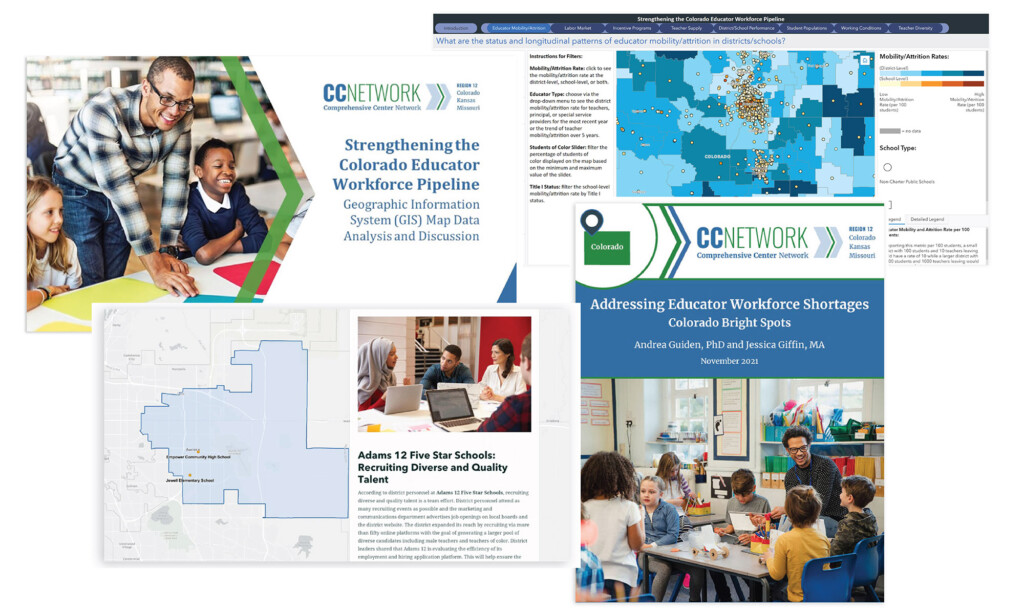Leading up to the 2022–23 school year, Colorado schools sought to fill 8,294 teaching positions representing 14.97% of all teaching positions in the state. Of those positions, 2,208 remained unfilled or were filled through a shortage mechanism (e.g., long-term substitutes, retired educators, alternative/emergency authorizations). The ability of schools and districts to retain teachers reduces the demand and expense related to recruitment and limits the negative impact teacher turnover has on student achievement and school improvement efforts. This is particularly true in the lowest performing schools and in high-poverty, high-minority school communities.
R12CC is collaborating with the Colorado Department of Education (CDE) to assist Colorado education stakeholders to address the statewide educator shortage using custom-designed geographic information system (GIS) maps and related resources (e.g., State Comparison Brief, Colorado Bright Spots Report). GIS maps incorporate a variety of demographic, socioeconomic, and talent management data that allow stakeholders to explore relationships and patterns, and identify possible bright spots where specific workforce pipeline approaches or strategies may have been effective.
With R12CC’s support, stakeholders will be able to use the GIS maps and related evidence on effective strategies for strengthening the educator workforce pipeline to take action to strengthen one or more aspects of the educator workforce pipeline (e.g., attracting, preparing, and retaining teachers); deepen their understanding of the Colorado educator workforce pipeline, including strategies and current approaches to strengthen and diversify the pipeline; and learn from/network with peers.
R12CC is also assisting CDE to update the Colorado Dropout Prevention Framework to support continuous improvement in student reengagement and recovery efforts. The current dropout rate in Colorado is 2.2%, an increase of 0.4 percentage points from 2021 and the first time the dropout rate increased since 2015.
The updated Dropout Prevention Framework’s innovation, utility, and adaptiveness to changing contexts will continuously improve and support CDE’s dropout prevention and student reengagement services in the present and future. To facilitate and support the framework’s dissemination, R12CC is working with CDE on their outreach to stakeholders about the use of the framework, developing strategy-specific implementation stories, building internal capacity for cross-office use, and planning for the framework’s long-term sustainability.
Project Updates
Year 5 Project Highlights
Work during our fifth and final project year continues to focus on providing high-quality technical assistance, building collaborative relationships, and supporting educational agencies to make systemic changes. View these project highlights to learn
Impact Story: Charting Pathways Toward a Strengthened Educator Workforce in Colorado
The Problem Across the United States, vacancies in the educator workforce have drastically increased, exacerbated by the COVID-19 pandemic.1 Leading up to the 2021–22 school year, Colorado schools sought to fill 5,729 teaching
Educator Workforce and Dropout Prevention: Spring 2024 Project Updates
In Colorado, R12CC continues to support Colorado education stakeholders’ use of a geographic information system (GIS) map to strengthen the workforce pipeline. Through GIS mapping, stakeholders gain a better understanding of factors impacting teacher shortages and retention and can identify
R12CC Projects Presented at National Conference
Team members from R12CC, the Colorado Department of Education (CDE), Kansas State Department of Education (KSDE), and Missouri Department of Elementary and Secondary Education (DESE) convened with stakeholders from across the country in Washington, DC at the Meeting the Moment
Voices from the Field: An Interview with Johann Liljengren from CDE
Voices from the Field spotlights stakeholders in Region 12 and their work to improve educational opportunities and outcomes. R12CC is privileged to collaborate with and share the insights of Johann Liljengren, Director of Dropout Prevention and Student Reengagement at the
CC-LIVE Aims to Make Accessing Highly Qualified Teachers Easier for School Districts
The CC-LIVE pilot program aims to address issues in the teacher pipeline with a new model that pairs experienced virtual teachers with on-site teachers who are new to the profession.
Colorado GIS Mapping Project Presented at National Conference
The Region 12 Comprehensive Center (R12CC) and Colorado Department of Education (CDE) presented the Strengthening the Colorado Educator Workforce Pipeline Geographic Information System (GIS) Map at the 2023 NCES STATS-DC Data Conference in Washington, DC. R12CC and CDE have
Using Data to Strengthen and Diversify the Educator Workforce
by Christina Lemon Since COVID, media headlines continue to claim there is a teacher exodus brewing, and that American education is in crisis. But do the data support these claims? In December 2021, the National Council on Teacher Quality (NCTQ)



